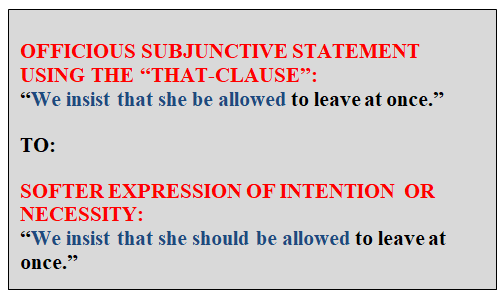Simpler alternatives for the subjunctive (Fourth of a 6-part series on the subjunctive form)This is the fourth of a six-part series on the subjunctive form, decidedly the most deviant and most intimidating of the three moods of the English language. Started last January 29, 2018, it will run every other day (except Sunday) until February 9.After our full-dress review of the subjunctive in the first three parts of this series, this form of the English language should no longer hold any terrors for us. With our clearer understanding of its uses and peculiar grammar behaviors, we should now be able to deal with the subjunctive as competently as we do with the indicative and imperative moods.
Even with a good grasp of the subjunctive, however, we need to remain cautious in using it. This is because subjunctive constructions, particularly those using “that”-clauses to state a desired outcome, often sound very formal and officious. Indeed, they often give rise to a language register that we won’t allow ourselves to be caught using if we had a choice or if we knew better.
We must understand that not everybody can acceptably give utterance to statements that use the subjunctive “that”-clause. In fact, they can justifiably be used only by individuals who can invoke a vested power—whether real or imagined—to compel other people beholden to them to follow what they say. To this group would belong statesmen, legislators, bureaucrats, jurists, lawyers, ideologues, clerics, and pedants.
Subjunctive “that”-clause constructions are definitely not for laypeople who have to deal with one another on equal terms and who expect to reach agreement largely on the basis of the intrinsic worth and logic of their respective ideas. For instance, without a particular audience in mind and without imagining yourself to be a hotshot legislator, political leader, or religious prophet, try saying this sentence aloud: “It is imperative that we hold snap elections for national posts right now.” At once you will see how absurd it is for people to use such “that”-clause subjunctives if they don’t have the vested power or moral authority to do so.
Fortunately for laypeople, the English language has two grammatically simpler and less formal-sounding alternatives to the “that”-clause” subjunctive form. These alternatives, which are much better suited for the mostly egalitarian communication situations that we will be encountering in our daily lives, are as follows:
(1) Using “should” in “that”-clauses that state commands or express intentions or necessity. A quick way to avoid the subjunctive form and minimize its officious tone is to use the auxiliary verb “should” together with the operative verb in the “that”-clause. Take these subjunctive statements: “We insist that she be allowed to leave at once.” “It is crucial that we be authorized to sign on the company’s behalf.” By using “should” in tandem with the operative verb in the “that”-clause, not only will the seemingly stilted subjunctive grammar be straightened out but the officious tone of these statements will also be softened somewhat: “We insist that she should be allowed to leave at once.” “It is crucial that we should be authorized to sign on the company’s behalf.”

In many situations, however, simple and forthright English can get us better results than such grandiosely commanding language: “She should be allowed to leave at once.” “We should be given the authority to sign on the company’s behalf.”
(2) Using the “for + infinitive” form of the verb instead of its subjunctive form. This is a more radical but not necessarily a better substitute for subjunctive “that”-clause constructions. Take these subjunctive statements: “We suggest that Eduardo defer his trip indefinitely.” “We recommend that she go on terminal leave.” By changing the verb in the main clause to a “concept expectation” noun, we can force the operative verb in the subjunctive “that”-clause to take the “for + infinitive” form: “Our suggestion is for Eduardo to defer his trip indefinitely.” “Our recommendation is for her to go on terminal leave.”
These alternative statements smoothly do away with the confusing subjunctive grammar, but they can reduce the proposed course of action to an excessively passive and deferential request. As such, use them only for dealing with highly difficult and authoritarian superiors who demand total obeisance.
We don’t have similar grammar alternatives for the “if” and “wish” subjunctive forms. The best we can do is to minimize mistakes in using them by strictly observing this rule: put the verb in the subjunctive only if the stated condition is hypothetical, unreal, or contrary to fact.
Take this sentence: “If I were [not “was”] present at that meeting, I would have vetoed that outrageous proposal.” The subjunctive verb “were” is correctly used here because the speaker was obviously absent from the meeting and is describing a hypothetical action that he was unable to do because of that absence.
On the other hand, if the situation described by the “if” clause is not false but has actually happened, its operative verb should be in the indicative form instead: “If she was [not “were”] sick that week, then it’s obvious why she wasn’t able to attend her classes.”
For this purpose, we will discuss simpler alternatives for the subjunctive in the next part of this series.
(Next week:
Avoidance options for very officious subjunctive sentences) February 7, 2018
This discussion first appeared as part of a weekly series in Jose A. Carillo’s “English Plain and Simple” column in The Manila Times
from 2004 to 2007 and it subsequently formed Chapter 79 of his book Give Your English the Winning Edge
, © 2009 by Jose A. Carillo. All rights reserved.